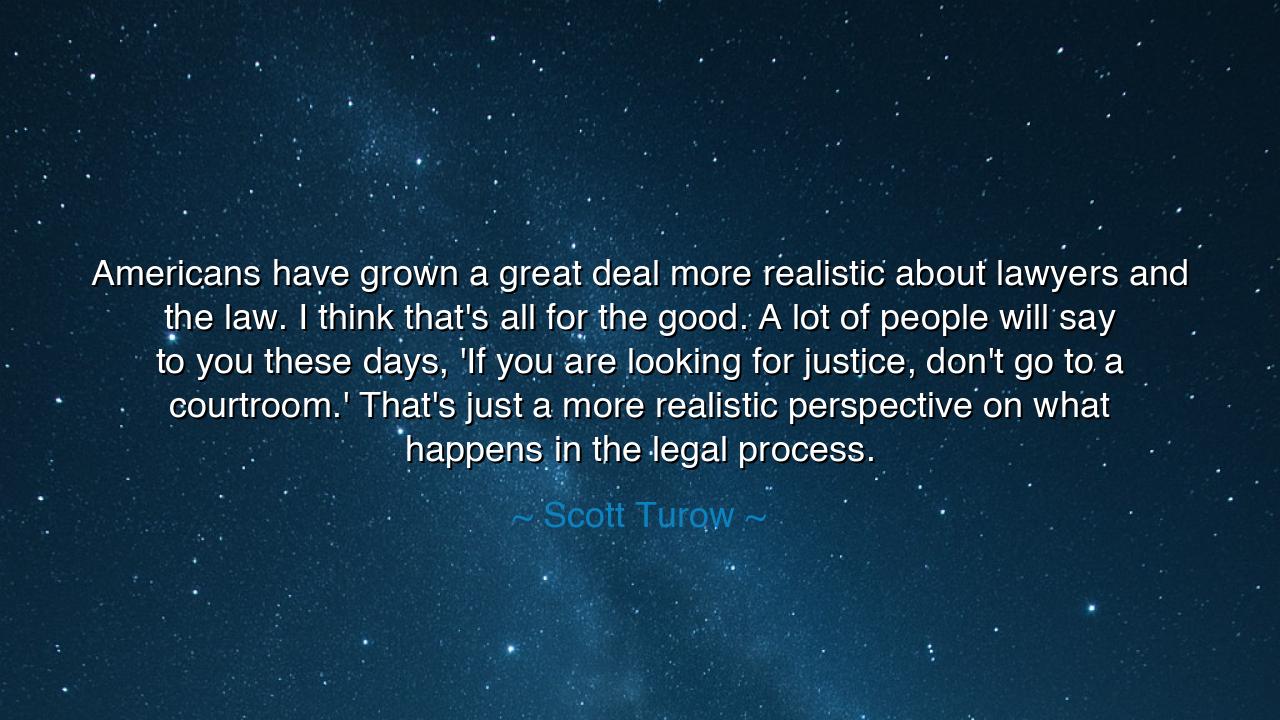
Americans have grown a great deal more realistic about lawyers
Americans have grown a great deal more realistic about lawyers and the law. I think that's all for the good. A lot of people will say to you these days, 'If you are looking for justice, don't go to a courtroom.' That's just a more realistic perspective on what happens in the legal process.






Hearken, O seekers of wisdom, to the words of Scott Turow, who observed the shifting tides of understanding among his people: "Americans have grown a great deal more realistic about lawyers and the law. I think that's all for the good. A lot of people will say to you these days, 'If you are looking for justice, don't go to a courtroom.' That's just a more realistic perspective on what happens in the legal process." In these words lies a reflection upon the tension between law and expectation, between ideal and reality, and the maturation of a society’s understanding of the instruments it has entrusted to deliver fairness.
Since the dawn of civilization, humans have sought to reconcile the lofty ideal of justice with the practicalities of governance. In Athens, the judges of the Heliaia presided over disputes with human wisdom tempered by bias; in Rome, the consuls and praetors interpreted statutes while contending with politics and power. Turow’s insight reflects this timeless truth: that the law is a human construct, noble in aspiration, yet imperfect in execution, and that those who serve as lawyers or judges are bound by mortality and circumstance.
Consider the case of the Scottsboro Boys in the 1930s, where nine African American youths were falsely accused and hastily tried for a crime they did not commit. Despite the presence of lawyers, legal codes, and courts, the process was marred by prejudice, haste, and social pressure. The eventual appeals and retrials highlighted both the power and the limitations of the legal process. Turow’s observation—that one should not automatically seek justice solely within a courtroom—echoes the lessons of history: law alone does not guarantee fairness, and the pursuit of justice requires vigilance beyond formal procedure.
In our modern age, the proliferation of media, public opinion, and legal complexity has further revealed the imperfections of the system. Lawyers, though skilled and learned, operate within a framework constrained by procedure, evidence, and institutional norms. Turow’s reflection invites a sober acknowledgment: to expect idealized outcomes from the courtroom is to misunderstand the nature of human institutions. The realistic perspective he praises is not cynicism but clarity—a recognition that law is a tool, not a panacea.
Yet this realism carries its own power. By understanding the limitations of the legal process, citizens are better equipped to navigate society, to advocate for reform, and to combine formal mechanisms with moral and social action. As the law evolves in response to culture and precedent, those who are aware of its constraints can guide it toward greater equity. Turow’s words, therefore, are both a caution and an encouragement: to temper expectation with knowledge, and to pursue justice with both discernment and determination.
History provides lessons from the ancients: Solon of Athens, though wise and just, recognized that law alone cannot transform hearts. In his reforms, he combined codified statutes with civic education and moral exhortation, understanding that justice emerges not solely from the courtroom, but from the character and engagement of the people. Turow’s reflection resonates with this wisdom: law is necessary, yet insufficient without the awareness, activism, and ethical commitment of society.
From this reflection emerges a timeless lesson: the pursuit of justice demands knowledge of both principle and process. Lawyers and courts are instruments, not infallible arbiters; citizens must cultivate discernment, patience, and civic responsibility. Turow’s insight encourages us to embrace a realistic perspective: understand the power of law, acknowledge its limitations, and engage actively in shaping the moral and social frameworks that support it.
Take this teaching into daily life: respect the law and those who practice it, yet temper your expectations with realism. Advocate for fairness, cultivate moral discernment, and recognize that true justice often requires effort beyond the confines of the courtroom. By doing so, you honor both the nobility of human aspiration and the practical realities of human institutions, ensuring that the pursuit of justice is guided by wisdom, perseverance, and clarity of vision.






AAdministratorAdministrator
Welcome, honored guests. Please leave a comment, we will respond soon